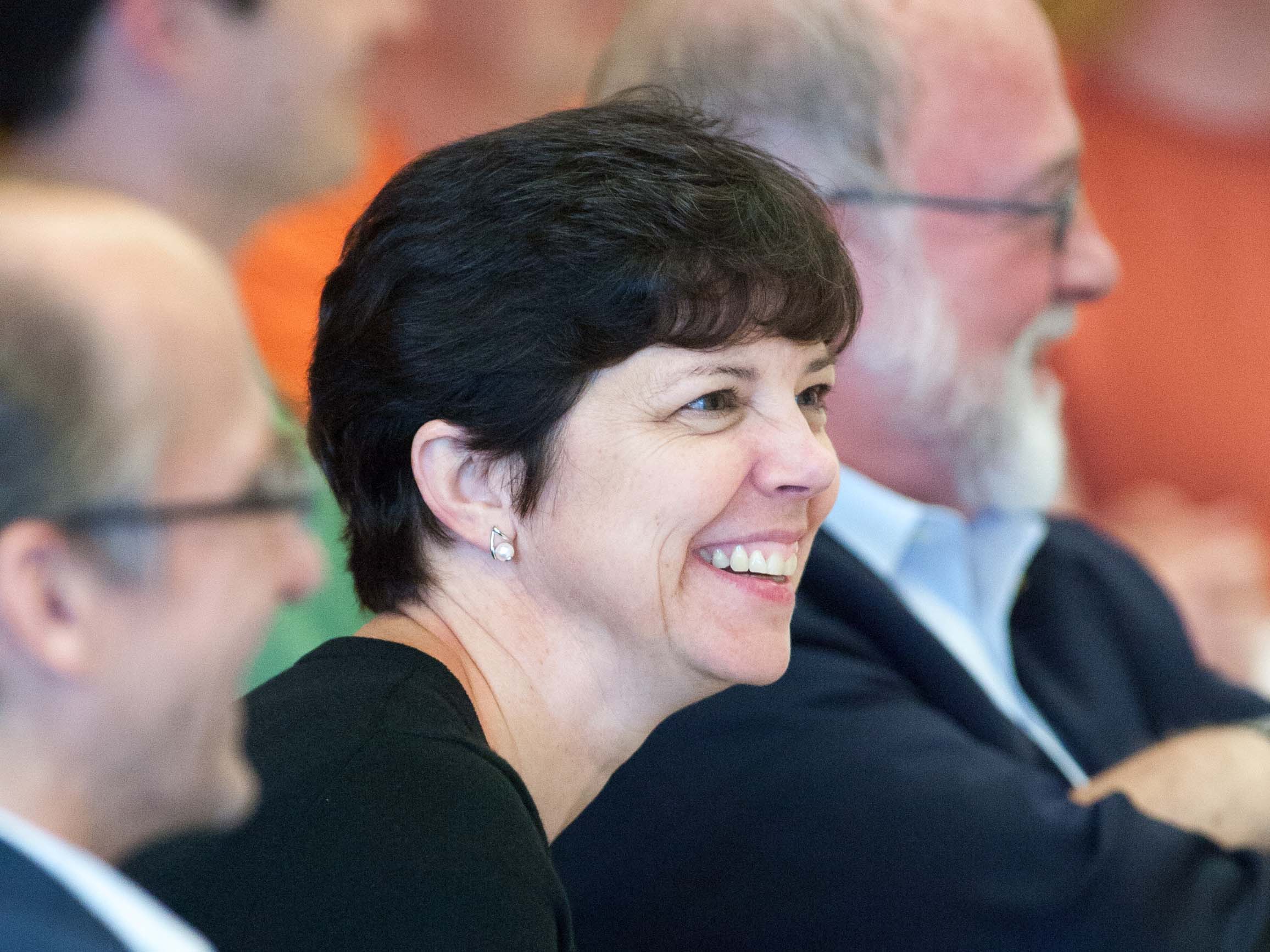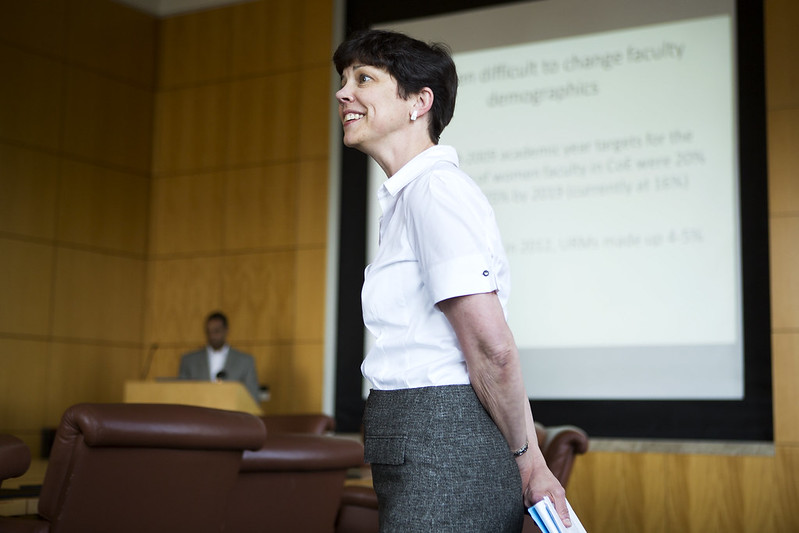
Jennifer Linderman: A legacy of leadership, scholarship and equity
Linderman retires after a career from a young researcher to a distinguished professor spanning over three decades.

Linderman retires after a career from a young researcher to a distinguished professor spanning over three decades.
Jennifer Linderman, the Pamela Raymond Collegiate Professor of Engineering at the University of Michigan, has retired after a career marked by transformative research, leadership, and dedication to diversity and inclusion. Linderman’s career from a young researcher to a distinguished professor spans over three decades, demonstrating her ongoing commitment to excellence, innovation and equity.
“Jennifer has consistently demonstrated outstanding achievements in scholarly research and creative endeavors,” said Sharon Glotzer, Anthony C. Lembke Department Chair of Chemical Engineering. “She’s amassed a record of sustained excellence in teaching and mentoring of students and junior colleagues, and, through service and other professional activities, brought distinction to herself, the department, and the university.”
“Jennifer has consistently demonstrated outstanding achievements in scholarly research and creative endeavors. She’s amassed a record of sustained excellence in teaching and mentoring of students and junior colleagues, and, through service and other professional activities, brought distinction to herself, the department, and the university.”
Sharon Glotzer
Anthony C. Lembke Department Chair of Chemical Engineering
A champion for diversity, equity and inclusion
Linderman has been an integral part of the Chemical Engineering department since 1988. As the first female faculty member in Chemical Engineering, she pioneered initiatives to foster an inclusive academic environment, and was named director of the University of Michigan’s ADVANCE program in 2016. Focused on institutional change, the ADVANCE program works directly with departments, schools and colleges to improve the university in the areas of faculty recruitment, faculty retention, workplace climate and leadership development. ADVANCE analyzes institutional data on and develops initiatives to support the needs of a diverse faculty in all fields.
As with her research, Linderman was interested in pursuing “systems-level” change in her work in diversity, equity and inclusion. “What processes and practices can we change or newly implement to improve faculty equity?” she said. “Evidence shows that if you improve hiring practices, retention, and workplace climate with an eye toward those who are underrepresented, you often improve it for all faculty. For example, if we make our practices more transparent, have robust mechanisms for mentoring, mitigate biases in faculty hiring, foster respect in the workplace, and support developing leaders, these are changes that will ultimately help everybody.”
Before being named the director of the University of Michigan’s ADVANCE program, Linderman served as associate dean for graduate education in the College of Engineering from 2014-2016. In this role, Linderman co-led NextProf, a program designed to encourage a diverse group of graduate students and postdocs to consider careers as engineering faculty. Linderman and engineering colleagues developed the program in 2012.

“In addition to her many research and teaching accomplishments, Jennifer has been deeply influential in the College of Engineering and across the university. In her role as associate dean in the college, she was deeply committed to the success of graduate students,” said Michael Solomon, Dean, Rackham School of Graduate Studies; Vice Provost for Academic Affairs, Graduate Studies; and Professor of Chemical Engineering. “As the director of ADVANCE, she led discussions across campus about how best to support our diverse faculty from the very first day they arrive here to pursue their careers.”
In recognition of her advocacy, Linderman received several awards including the Harold R. Johnson Diversity Service Award and the Rackham Distinguished Graduate Mentor Award.
A dedicated educator and mentor
Beyond advocacy, Linderman was a dedicated educator, providing instruction for multiple undergraduate and graduate courses, including material and energy balances, heat and mass transfer, mathematical methods, and chemical signaling.
She is widely known for her commitment to mentoring in the classroom, lab, and beyond, which has also earned her accolades such as the Women’s Initiatives Committee’s Mentorship Excellence Award from the American Institute of Chemical Engineers in 2019.
“I am sincerely grateful for Jennifer’s selfless dedication to mentoring me as both a graduate student and young faculty member, guiding me through the intricacies of an academic career,” said Eranda Nikolla, Professor of Chemical Engineering. “Her support has been invaluable to me throughout my academic journey.”
“I am sincerely grateful for Jennifer’s selfless dedication to mentoring me as both a graduate student and young faculty member, guiding me through the intricacies of an academic career. Her support has been invaluable to me throughout my academic journey.”
Eranda Nikolla
Professor of Chemical Engineering
From students to colleagues, Linderman has served as a strong, reliable presence and leader in the department throughout her career.
“Jennifer’s wise counsel has guided many faculty discussions. She has a steady, committed personality, a brilliant mind, a strong sense of ethics, and a kind heart,” said Ronald Larson, George G. Brown Professor of Chemical Engineering and Alfred H. White Distinguished University Professor at the University of Michigan. “Her presence in our department, college, and university will be long remembered and celebrated.”
Research and academic contributions
Linderman’s research interests have revolved around systems biology, focusing on quantitative systems pharmacology, immunology, cell signaling, cancer, tuberculosis and computational modeling. Early in her career, she co-authored Receptors: Models for Binding, Trafficking and Signaling, a key text in the then-nascent field.
Her passion for systems biology stemmed from her early research endeavors. She envisioned a holistic approach to understanding biological processes, transcending reductionist methodologies. Her work in computational modeling has shed light on complex diseases like tuberculosis and cancer, offering insights into treatment strategies and drug development.
Notably, Linderman’s collegiate professorship ceremony, where she delivered a lecture on tuberculosis, underscored her dedication to tackling pressing global health challenges. Tuberculosis is one of the deadliest infectious diseases, killing over 1 million worldwide in 2022. Through computational modeling, Linderman and her colleagues have unraveled the intricacies of diseases, paving the way for innovative therapeutic interventions.
Her collaborative efforts with fellow researchers Greg Thurber and Peter Tessier in cancer treatment exemplify her interdisciplinary approach. By harnessing the power of systems biology, they’ve contributed to the advancement of antibody drug conjugates, heralding a new era in personalized medicine.
“Her work has provided a lot of clarity and insight to the field, helping to highlight why the recent surge of FDA-approved ADCs is so successful for patients and how we can design the next wave of effective agents,” said Greg Thurber, Associate Professor of Chemical Engineering and Associate Chair for Graduate Education.
Legacy and farewell
As Linderman looks ahead to the next chapter, her legacy of leadership, scholarship, and equity will endure in the department and at the University.
“I’ve learned so much from the many graduate students and postdocs I’ve worked with, and I look forward to following their careers and the discoveries they will make to improve the world,” Linderman said.
“I’ve learned so much from the many graduate students and postdocs I’ve worked with, and I look forward to following their careers and the discoveries they will make to improve the world.”
Jennifer Linderman
Pamela Raymond Collegiate Professor of Engineering
Her impact on students, colleagues, and the academic community serves as a testament to her unwavering dedication and vision. While her presence will be missed, her contributions will continue to inspire generations of scholars.
“Jennifer’s retirement certainly marks the end of an era. She’s leaving behind more than just a list of accomplishments; she has etched her wisdom into our minds and kindness into our hearts,” said Sayed Ahmad Almohri, a Chemical Engineering PhD student. “Each of us that had the chance to work with Jennifer knows the huge gap that her departure leaves.”